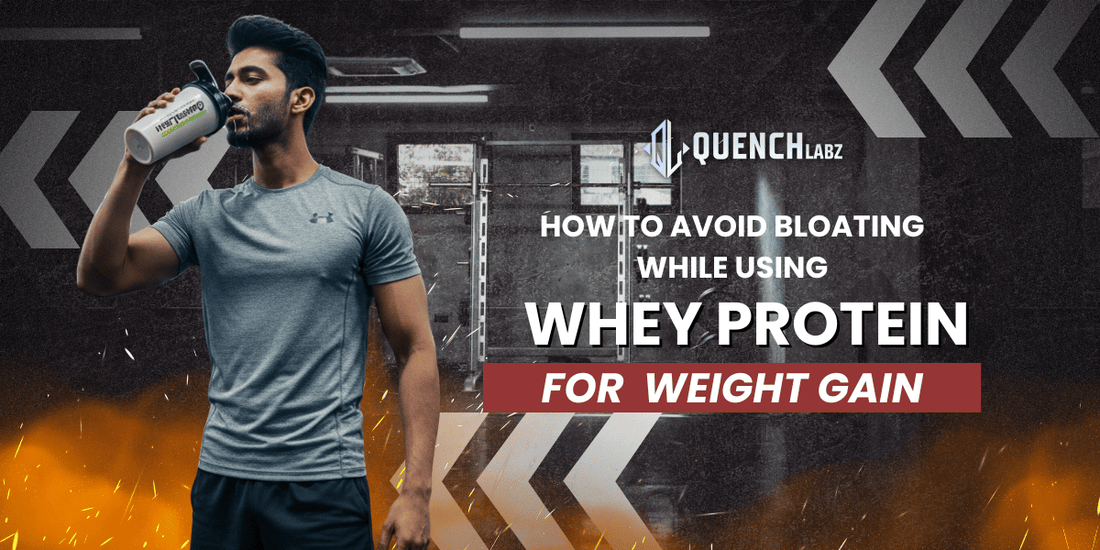If you’ve started taking whey protein for weight gain, you might have faced this uncomfortable issue: bloating. Instead of feeling energized and fueled, you’re stuck with a heavy stomach, gas, or that puffy, sluggish feeling that makes workouts harder.
The good news? You’re not alone, and bloating doesn’t mean whey protein isn’t for you. It usually comes down to how your body digests it, when you take it, and what you mix it with. With a few smart tweaks, you can enjoy the benefits of whey protein without feeling weighed down.
Why Does Whey Protein Cause Bloating?
Bloating often happens because of digestion issues. Here are the most common reasons:
-
Lactose sensitivity – Whey concentrate has more lactose, which can upset sensitive stomachs.
-
Overloading protein in one go – Taking huge scoops at once can overwhelm digestion.
-
Mixing with heavy foods – Combining protein shakes with oily or complex meals can cause gas.
-
Not enough water – Protein digestion needs hydration, and without it, your stomach can struggle.
-
Low-quality powders – Cheap powders with fillers, artificial flavors, or too much sugar can trigger bloating.
Tips to Avoid Bloating with Whey Protein for Weight Gain
1. Choose the Right Type of Whey Protein
If regular whey concentrate gives you trouble, try whey protein isolate. It has less lactose and is easier on digestion. Some people also prefer hydrolyzed whey, which is partially broken down for faster absorption.
2. Don’t Overdo the Serving Size
One of the biggest beginner mistakes is thinking that 2–3 scoops at once will speed up muscle growth. In reality, your body can only absorb a certain amount of protein at a time.
👉 Stick to 1 scoop (around 25–30g protein) per serving and spread your intake throughout the day.
3. Mix with Water Instead of Milk (if Lactose Sensitive)
Mixing whey protein with milk can double up the lactose load. If you’re lactose intolerant, this almost guarantees bloating.
👉 Try blending it with water, almond milk, or lactose-free milk. It’s lighter and easier to digest.
4. Add Digestive Boosters
A simple trick is adding ingredients that improve digestion:
-
A pinch of ginger powder in your shake
-
Papaya or pineapple slices (they contain natural enzymes)
-
Probiotics or digestive enzyme supplements if needed
These little changes can make whey protein feel a lot lighter on your stomach.
5. Stay Hydrated
Protein digestion produces by-products that your body needs to flush out. If you’re not drinking enough water, bloating and constipation can creep in.
👉 Aim for at least 3–4 liters of water daily if you’re on a weight gainer or high-protein diet.
6. Don’t Take It Too Fast
Chugging down your whey protein shake in 20 seconds can overload your stomach. Sip it slowly and give your body time to process it.
7. Check the Quality of Your Whey Protein
Not all protein powders are created equal. Some cheaper ones have fillers, gums, and excess sweeteners that mess with digestion. Always pick a high-quality whey protein for weight gain that has a clean ingredient list.
Real-Life Example
One of my friends started using whey protein for weight gain and kept complaining about bloating. Turned out he was drinking three scoops at once with whole milk after dinner. Once he switched to isolate, used just one scoop with water post-workout, and added another serving mid-day, the bloating disappeared and his results improved.
Sometimes, it’s just about balance, not giving up.
Final Thoughts
Bloating doesn’t mean whey protein is bad for you. It just means your body needs a little help digesting it better. Choose the right type, control portion sizes, stay hydrated, and pay attention to what you mix it with.
When done right, whey protein can be your best partner for healthy weight gain without the discomfort.






